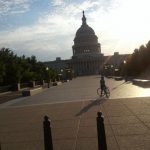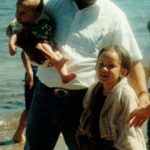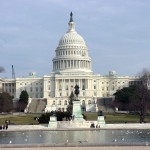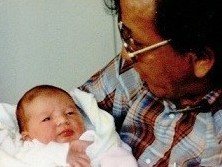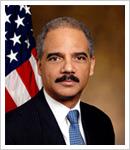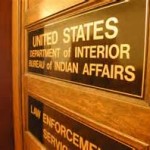Attorney General Eric Holder Delivers Remarks During the White House Tribal Nations Conference
Washington, DC
United States
~
Wednesday, December 3, 2014
Good morning. I want to thank you all for such a warm welcome. And I would like to thank President Obama for hosting this important White House conference.
It is a pleasure to be here today, and a privilege to join so many distinguished public servants, passionate activists, dedicated leaders, and good friends as we celebrate vital achievements, discuss critical challenges, and renew our shared commitment. All of the leaders in this room – and so many others across the country – are indispensable partners in our efforts to fulfill the promise of the U.S. government’s relationships with sovereign tribes. You are critical allies in our ongoing work to move this country closer to its most treasured ideals: of equality, opportunity, and justice under law. And you continue a proud tradition of tribal leaders who have stepped to the forefront of efforts to preserve cultural values, to enforce treaty obligations too often ignored, and to secure the rights and benefits to which all American Indians and Alaska Natives are entitled.
I know this responsibility has rarely been easy. But it is a solemn obligation that you and your ancestors have carried for generations – through injustice, violence, and deprivation; through broken promises, deferred action, and denial of rights. Over the years, you’ve seen avenues into prosperity foreclosed by bigotry. You’ve seen opportunities curtailed by deplorable discrimination. And you’ve held firm even at times – in past decades – when the federal government insisted that the men and women of tribal nations forsake their culture and their heritage, and be slowly, painfully, grudgingly assimilated, while their tribal governments were neglected—or even terminated.
Together, you and your predecessors faced down tremendous adversity to safeguard your lands, protect your cultures, and strengthen your ability to choose your own future. And, particularly in the last half-century, your commitment has finally been met by a U.S government that’s prepared to acknowledge the failures and injustices of the past – and to work with and empower you to chart a new course.
That is why, during the earliest days of the Obama Administration – in 2009 – I traveled to St. Paul, Minnesota, for a historic Tribal Nations Listening Session, to hear directly from tribal officials about the actions we could take together to build a relationship of coexistence and cooperation. I was joined at the time by roughly 100 Department of Justice officials representing more than 20 different components, as well as more than 400 tribal leaders and representatives from around the nation – some of whom are here in the audience today. We discussed the epidemic of violence that cut a vicious path through Indian Country, where violent crime rates reached two, four, and sometimes over ten times the national average. We spoke about the vital needs of women on tribal lands, who faced a shocking reality in which 1 out of every 3 American Indian or Alaska Native women would be raped in her lifetime. And we spoke about children who were brought up in poverty, in the midst of uncertainty and rampant abuse.
As I listened, during that visit, I heard the pain in the voices of the people I was meeting with – people whose parents and grandparents had made indelible contributions to this country, but who had been shut out of the process of self-determination, and denied access to opportunities for success. I felt, even then, a deep and powerful comprehension of the magnitude of discrimination that tribal communities have faced – discrimination that bore a distressing resemblance to the experience of millions of people of color throughout our history, including those brave pioneers I remember watching as a young child, on a black-and-white television in the basement of my family’s home in New York City, as they marched for equality and rallied for the opportunities that should have been their birthright.
I recognized, on a basic, human level, the desire for empowerment, and the need for mutual trust and understanding, that I encountered during my listening session in Indian Country. And I left St. Paul both inspired and invigorated by a firm commitment to the work we must do together.
After that conference, I announced not only an intention to work closely with you to move in a positive direction, but a desire to take concrete steps forward – and to implement a fundamentally new approach that emphasized collaboration between sovereign tribes and the federal government. I announced the creation of a Tribal Nations Leadership Council to advise me on matters critical to Indian Country – a council made up of men and women not selected by the federal government, but elected by their own peers. I stated my determination to work with Congress to pass important legislation like the Tribal Law and Order Act in order to provide tribal governments with more of the authority, resources, and information they need to appropriately hold to account those who commit crimes in Indian Country. I directed the department to increase the engagement of United States Attorney’s Offices with tribes in their districts and work to expand Indian Country prosecutions. And I called for the swift reauthorization of a revised and strengthened Violence Against Women Act, including provisions recommended by the Justice Department that would, for the first time in decades, protect and empower Indian women against abuse by non-Native men.
I am proud to say that, thanks to the hard work and dedication of many of the men and women in this room today, every single one of these goals has been met. And all of these commitments have been fulfilled.
In every instance, progress was made possible by our shared determination to overcome the effects of what my predecessor, former Attorney General Robert F. Kennedy, once called the “tragic irony” of American Indian oppression, and to work together to forge an enduring, positive, collaborative relationship between the federal government and sovereign tribes. And I am pleased to note that, over the last six years – by committing to this new and necessary approach – together with President Obama and our colleagues throughout the Administration, we have expanded on our initial groundbreaking efforts and helped to launch a new era of empowerment and opportunity.
Through cooperation between tribal justice leaders and U.S. Attorney’s Offices – including new tribal Special Assistant U.S. Attorneys, who prosecute Indian Country cases in federal and tribal courts alike – we have dramatically strengthened interactions between federal and tribal law enforcement and prosecutors, and transformed a dysfunctional process that too often allowed domestic violence cases in Indian Country to languish and disappear—the sad result of a system in which the federal government and tribal officials would too rarely communicate, let alone collaborate. Every U.S. Attorney’s Office with Indian Country jurisdiction is now required to engage with the tribes in its district to develop operational plans to improve public safety and prevent and reduce violence against women and girls. A review of FY 2013 cases filed against defendants in Indian Country showed a 34 percent increase from 2008 numbers—the year before the department’s Indian Country initiative began. And since the bipartisan passage of the landmark Violence Against Women Reauthorization Act in 2013, the Justice Department has announced three pilot projects to begin early implementation of special domestic violence criminal jurisdiction, which extends tribal prosecution authority over non-Indian perpetrators of domestic violence for the first time in more than 35 years. As a result, more than 20 non-Indians have been charged by tribal prosecutors – and more than 200 defendants have been charged under VAWA’s enhanced federal assault statutes. This total includes more than 40 cases involving charges of strangulation or suffocation, which are often precursor offenses to domestic homicide.
We’re building on this work through targeted programs like the American Indian/Alaska Native Sexual Assault Nurse Examiner-Sexual Assault Response Team Initiative – under the leadership of our Office for Victims of Crime – which is designed to strengthen the federal response to sexual violence in tribal communities. Just a few weeks ago, I had the opportunity to meet with the Initiative’s Coordination Committee. I received their formal report and concrete recommendations on improving federal agency response to sexual violence in tribal nations.
And I pledged then – and reiterate today – that these recommendations will serve as a solid basis for robust action as we seek to gain the trust of assault survivors; to break the culture of shame that prevents far too many victims from coming forward; and to build upon the exemplary work that tribal authorities, law enforcement leaders and victim advocates across the country are doing every day to help us turn the tide against sexual violence.
We are also expanding our work with tribal governments to protect children in Indian Country through the Task Force on American Indian and Alaska Native Children Exposed to Violence. Since it was established last year, the Task Force has already made important progress, led in part by the outstanding work of its distinguished Advisory Committee co-chairs, former U.S. Senator Byron Dorgan and Grammy-winning artist – and member of the Iroquois Nation – Joanne Shenandoah. As the Task Force moves ahead, they will continue to coordinate closely with federal leaders to support and strengthen the work all of you are leading throughout tribal lands.
Beyond these efforts, we have taken a collaborative approach to break the gridlock on issues that have been a source of contention between tribal nations and federal Administrations for decades.
In 2010, the Obama Administration reached a historic settlement – totaling $3.4 billion – that resolved Cobell v. Salazar, a class-action lawsuit on trust accounting and mismanagement that had been pending for fifteen years. Since October of that year, the United States has settled the trust-mismanagement claims of 81 federally recognized tribes, putting an end to decades of bitter litigation and providing over $2.6 billion to tribes across the country. These settlements – which place no conditions on the use of funds – have spurred tribal investments in long-term economic development initiatives, infrastructure, and expansion of tribal government services. And as part of the agreements, we established procedures for improving communication and avenues for alternative dispute resolution – so that, in the future, we can more effectively collaborate to resolve issues involving trust funds and assetswithout costly and long-running litigation.
More broadly, we’ve worked to protect water rights and natural resources on tribal lands. And we’ve vastly expanded our outreach to – and cooperation with – Indian tribes across the continent, institutionalizing ways to seek input on environmental concerns and gaining critical insights into the environmental needs of tribal nations from coast to coast. Today, I can announce that we are releasing a revised Environmental Justice Strategy and Guidance, outlining how we will work to use existing environmental and civil-rights laws to help ensure that all communities, regardless of their income or demographics, are protected from environmental harm. Across the board – from our collaboration with and funding of the Intertribal Technical-Assistance Working Group, or ITWG, which uses peer-to-peer education to enhance effective prosecution practices in Indian Country, to our formal conversations with sovereign tribes to discuss ways to expand and enforce the voting rights of American Indians and Alaska Natives, including a proposal to require state and local election administrators whose territory includes tribal lands to place at least one polling site in a location chosen by the tribal government – this Administration is standing up for tribal sovereignty, tribal self-government, and tribal power. We are defending the rights of men and women in Indian Country to execute their own laws, to implement their own practices, and to perform their own civic services. And we will do everything in our power to ensure that, in the future, efforts like these will become standard practice.
To that end, last year, I announced that the Justice Department would take steps to draft and adopt a new Statement of Principles to guide all of the actions we take in working with federally recognized Indian tribes. Developed in consultation with the leaders of all 566 tribes, that Statement of Principles was meant to codify our intention to serve not as a patron, but as a partner, in Indian country – and to institutionalize our efforts to reinforce relationships, reform the criminal justice system, and aggressively protect civil rights and treaty rights. I am proud to say that our Statement of Principles is now complete. It has taken effect. And it will serve as a guide for this Administration – and every Administration – as we seek to build the more perfect Union, and the more just society, that every individual deserves.
All of these achievements are vital – and many of them are nothing short of groundbreaking. But, like all of you, I recognize that the longevity of our accomplishments depends not only on the strength of our convictions, but on the ability and the willingness of those who come after us to build upon the progress that we have set in motion.
After all, for everything that’s been achieved so far, a great deal of important, life-changing work remains to be done. That’s why the Department of Justice is committed to programs like the Gaye L. Tenoso Indian Country Fellowship—named for a beloved and extraordinary member of our DOJ family, and an enrolled member of the Citizen Potawatomi Nation of Indians, who worked tirelessly to advance the federal government’s relationships with sovereign tribes and to defend the interests of Indian and Alaska Native communities from coast to coast. Although Gaye passed away this summer, the fellowship that bears her name is creating a new pipeline of legal talent with expertise and deep experience in federal Indian law, tribal law, and Indian Country issues. I’m proud to say the very first Indian country fellow has been selected, and Charisse Arce [sha-REESE AR-see], of Bristol Bay, Alaska, will be appointed to a three-year term position in the United States Attorney’s Office in the District of Arizona, where she will be assigned to the district’s Indian Country Crime Section. She will also serve a portion of her appointment in a tribal prosecutor’s office or with another tribal legal entity within the district.
In addition to establishing this vital fellowship, the Department of Justice is reinforcing and increasing staff for the Office of Tribal Justice—including experts with a deep understanding of the laws impacting Indian Country—to make certain that Indian men, women, and children will always have a voice in the policies and priorities of the Justice Department. And we are redoubling our support of the Indian Child Welfare Act, to protect Indian children from being illegally removed from their families; to prevent the further destruction of Native traditions through forced and unnecessary assimilation; and to preserve a vital link between Native children and their community that has too frequently been severed – sometimes by those acting in bad faith.
Today, I am pleased to announce that the Department of Justice is launching a new initiative to promote compliance with the Indian Child Welfare Act. Under this important effort, we are working to actively identify state-court cases where the United States can file briefs opposing the unnecessary and illegal removal of Indian children from their families and their tribal communities. We are partnering with the Departments of the Interior and Health and Human Services to make sure that all the tools available to the federal government are used to promote compliance with this important law. And we will join with those departments, and with tribes and Indian child-welfare organizations across the country, to explore training for state judges and agencies; to promote tribes’ authority to make placement decisions affecting tribal children; to gather information about where the Indian Child Welfare Act is being systematically violated; and to take appropriate, targeted action to ensure that the next generation of great tribal leaders can grow up in homes that are not only safe and loving, but also suffused with the proud traditions of Indian cultures.
Ultimately, these children – and all those of future generations – represent the single greatest promise of our partnership, because they will reap the benefits of our ongoing work for change. In the last six years, we have worked together in a shared effort to end misunderstanding and mistreatment, and to bring about a triumph of vision over the status quo; of ingenuity over incapacity; and of progress over stagnation. We have laid an enduring foundation as we strive to empower vulnerable individuals, and give them the tools they need not to leave their communities, but to bolster them; not to abandon their ways of life, but to strengthen them.
Of course, there are many more challenges still before us. And we’ve seen all too clearly that the barriers erected over centuries of discrimination will not be surmounted overnight. But we face a brighter future today because we have placed our faith not in conflict or division, but in cooperation and respect; in the understanding that, though we live in different cultures, with different traditions, we share the same values. We believe that sovereign nations have the right to protect their citizens from harm, and that no perpetrator of domestic violence should be granted immunity because of the color of his skin. We understand that promises of autonomy have meaning, and should not be overturned through the changing desires of different federal Administrations. And we recognize that any child in Indian Country – in Oklahoma, or Montana, or New Mexico – is not fundamentally different from an African-American kid growing up in New York City. And neither child should be forced to choose between their cultural heritage and their well-being.
From the assurance of equal rights and equal justice, to the power of democratic participation and mutual aid, we are joined together by principles as old as time immemorial – principles embodied both by men and women whose ancestors lived on this continent centuries ago, and by those who have newly arrived on our shores. This is my pledge to you – here, today: that, because of our partnership – because of the record we’ve established; because of the foundation we’ve built – no matter who sits in the Oval Office, or who serves as Attorney General of the United States, America’s renewed and reinforced commitment to upholding these promises will be unwavering and unchangeable; powerful and permanent.
That is the legacy of our work together – not only the groundbreaking accomplishments I have described today, but the historic dedication to partnership that has made them possible. Although my time in this Administration will soon come to an end, we have embedded a commitment to tribal justice in the fabric of the Justice Department that I know will continue long after my departure. I will always be proud of the enduring, positive, and collaborative relationship we have built; of the life-changing work we have completed; and of the new era of progress that we have begun. It is my sincere hope that as the history of this Department of Justice is written, great attention will be paid to our accomplishments in interacting with our Native brothers and sisters. This has been a personal priority for me.
I want to thank you all, once again, for your passion, your perseverance, and your steadfast devotion to the work of our time. I am humbled to stand with you, today and every day. I am grateful for your friendship. And I look forward to all that we will achieve – together – in the months and years ahead.
Thank you.
Topic:
Tribal Justice
Component:
Office of the Attorney General
The United States Department of Justice, Office of Public Affairs, Justice News –
http://www.justice.gov/opa/speech/attorney-general-eric-holder-delivers-remarks-during-white-house-tribal-nations
Accessed Dec 4, 2014, 5 pm
